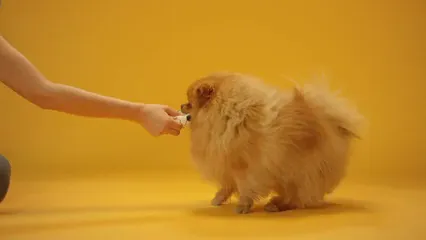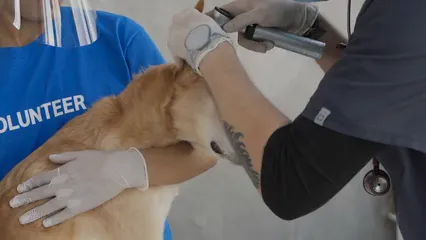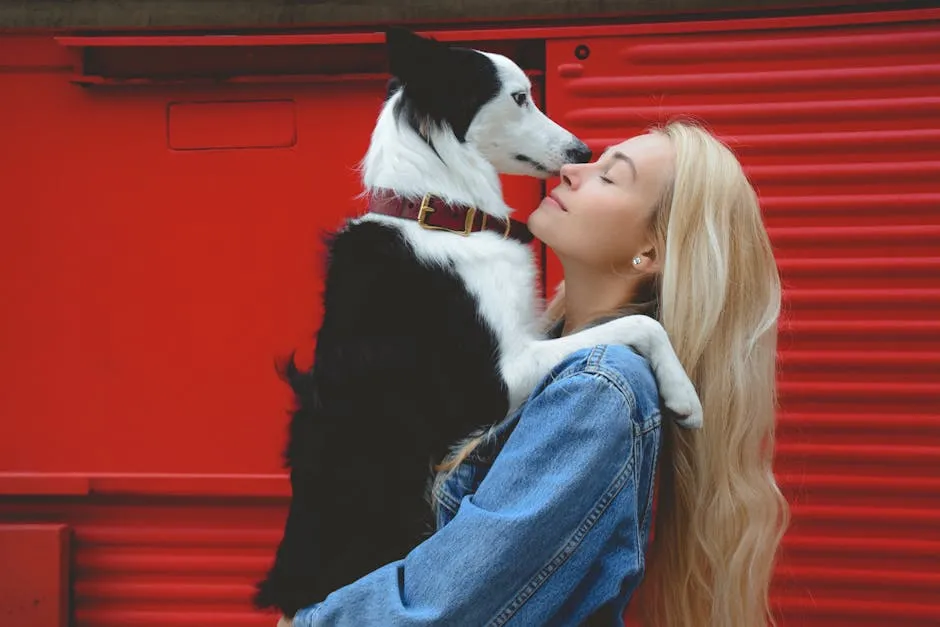
Why Is My Dog Licking Everything? Understanding the Causes and Solutions
Introduction
Is your dog licking everything in sight? You’re not alone. Many dog owners face this puzzling behavior. While some licking is normal, excessive licking might indicate deeper issues. This article will help you understand why dogs lick and offer solutions for common problems.
While we’re at it, why not keep your dog hydrated on the go? A Pet Water Bottle is a must-have for any dog owner. It’s perfect for walks, hikes, or just a day out at the park. Hydration is key to keeping your pup happy and healthy!
Summary and Overview
In this article, we’ll explore several key points about dog licking behavior. First, we’ll distinguish between normal and excessive licking. Next, we’ll emphasize the importance of consulting a veterinarian if licking becomes excessive. This will help you navigate through the main sections, which include understanding licking behavior, reasons behind it, and treatment options.
And speaking of treatment options, have you ever thought about keeping your dog entertained? An Interactive Dog Toy can be a game-changer. It keeps their minds sharp and can reduce excessive licking caused by boredom.

Understanding Dog Licking Behavior
Normal vs. Excessive Licking
Dogs naturally lick for various reasons. Normal licking helps them explore their environment, shows affection, and serves as a grooming mechanism. For example, your dog may lick your hand to show love or clean itself after a meal.
However, when licking becomes excessive, it can signal a problem. Excessive licking often indicates behavioral issues or health concerns. If your dog licks the same spot repeatedly or licks everything obsessively, it might require attention.
Speaking of grooming, have you considered investing in a Dog Grooming Brush? Regular grooming can help reduce licking by keeping their fur clean and free from irritants!
Natural Instincts
Dogs have an instinctual need to lick. They explore their surroundings through taste and touch. Puppies often lick their mother for comfort and nourishment. This behavior carries into adulthood, although it can manifest in various ways.
Exploratory vs. Compulsive Licking
Licking can be exploratory or compulsive. Exploratory licking occurs when dogs investigate new textures or tastes. On the other hand, compulsive licking happens without purpose. This behavior can lead to skin irritations or even injuries. Understanding the difference is crucial for determining the appropriate response.
When you notice your dog licking excessively, look for patterns. Ask yourself: When does the licking happen? Is it triggered by specific situations, like new environments or stress? Observing these details can provide insight into your dog’s behavior and help you address the issue effectively.
If your dog’s licking seems unusual or bothersome, consider consulting a veterinarian. They can help identify any underlying medical issues or recommend behavioral modifications. Remember, your dog’s well-being depends on understanding their unique needs.

Reasons Dogs Lick Everything
Dogs are curious creatures. Their natural instinct drives them to lick everything around them. But why do they engage in this behavior? Let’s break down the reasons behind it.
Natural Instincts
Licking is a fundamental way for dogs to communicate and explore their environment. When dogs lick, they gather information about their surroundings. This behavior is especially prominent in puppies, who often lick their mothers for comfort and nourishment. As they grow, this instinct continues.
Additionally, licking plays a crucial role in grooming. Dogs lick themselves to clean their fur and skin, similar to how cats groom themselves. This self-grooming helps maintain their hygiene. You may notice your dog licking your hands or face as well. This can be their way of expressing affection or seeking attention.
Health Issues
Sometimes, excessive licking is a signal of health problems. It’s essential to recognize these signs and consult a veterinarian if needed.
Gastrointestinal Problems
If your dog has an upset stomach, they may lick surfaces more often. This behavior can occur when they feel nauseated. Licking may help them cope with discomfort or expel excess saliva. If you notice increased licking alongside vomiting or loss of appetite, it’s time to seek professional help.
Skin Allergies and Infections
Allergies can lead to itchy skin, prompting your dog to lick excessively. Common allergens include pollen, dust, or certain foods. If your dog licks their paws or specific body parts repeatedly, they might be dealing with skin irritations. These conditions can lead to infections if not addressed.
Pain or Discomfort
If your dog is in pain, they may lick the affected area. This behavior is often seen in dogs with injuries or conditions like arthritis. If your dog excessively licks a joint or limb, it’s essential to consult a veterinarian. Identifying and treating the source of pain can help your dog feel better.

Behavioral Issues
Licking can also stem from behavioral problems. Understanding these triggers is vital for addressing the issue.
Anxiety or Stress
Dogs often use licking as a self-soothing mechanism during stressful situations. Changes in the environment, loud noises, or separation from owners can cause anxiety. If you notice your dog licking more during these times, it could be a coping strategy. Providing a calming environment and engaging activities can help alleviate their stress.
One way to help soothe an anxious pup is through Dog Anxiety Relief Chews. These can help calm your furry friend during stressful situations.
Boredom
A lack of mental and physical stimulation can lead to compulsive licking. Dogs need regular exercise and playtime to stay happy. If they don’t receive enough attention, they may resort to licking as an outlet for their pent-up energy. Incorporating interactive toys and regular walks can help keep them engaged.
Attention-Seeking Behavior
Sometimes, dogs lick to get attention from their owners. If you consistently respond to their licking, they may continue this behavior to seek your focus. Ignoring the licking and rewarding alternative behaviors can help break this pattern.
Understanding why your dog licks everything is crucial for their well-being. By recognizing the reasons behind this behavior, you can provide the necessary support. If licking becomes excessive, consider consulting a veterinarian to rule out any medical issues.

Identifying the Cause of Licking
Observational Techniques
When your dog starts licking everything, it’s essential to observe the behavior closely. Noticing when and where this licking occurs can provide valuable clues. For instance, does your dog lick after meals or during stressful situations? Keeping a log of this behavior can help you identify patterns.
Note any changes in your dog’s environment or routine. Have there been new additions to the household? Changes in your schedule? These factors can contribute to licking. A calm and consistent environment often helps dogs feel secure. Your observations will be instrumental in understanding their needs.

When to Consult a Veterinarian
Sometimes, licking can signal underlying health issues. If you notice significant changes in your dog’s licking patterns, it’s time to consult a veterinarian. Pay attention to any accompanying symptoms. Redness, irritation, or hair loss may indicate allergies or infections.
If your dog licks a specific area repeatedly, it could be a sign of discomfort or pain. These signs warrant professional evaluation. Early intervention is crucial for addressing potential health concerns. Trust your instincts; if something seems off, don’t hesitate to seek help.
Treatment and Management Strategies
Behavioral Modifications
Managing excessive licking often begins with behavioral modifications. Positive reinforcement techniques can help discourage this behavior. When your dog stops licking, reward them with treats or praise. This encourages them to engage in more appropriate behaviors.
Engaging activities can also reduce boredom-induced licking. Regular exercise is vital for your dog’s mental and physical well-being. Take your dog for walks, play fetch, or provide interactive toys. Keeping their mind stimulated can decrease the urge to lick excessively.
Consider incorporating puzzle toys or training sessions into your daily routine. These activities not only keep your dog occupied but also strengthen your bond. Remember, a tired dog is often a happy dog. The more engaged they are, the less likely they are to lick out of boredom.

Environmental Adjustments
Creating a stimulating environment for your dog is essential. A bored dog may resort to excessive licking. Start by providing engaging toys that challenge their minds. Puzzle toys can keep them occupied while they solve how to get treats out. You might also consider rotating their toys regularly to keep things fresh and exciting.
Regular exercise is just as crucial. Daily walks or playtime at the park can help your dog burn off excess energy. Aim for at least 30 minutes of physical activity each day. Activities like fetch or tug-of-war can also strengthen your bond while keeping them active.
Additionally, mental stimulation is vital. Teach your dog new tricks or commands. This not only engages their mind but also builds their confidence. You can incorporate training sessions into your daily routine to ensure your dog stays mentally fit.
And while you’re at it, don’t forget to equip yourself with a Dog First Aid Kit. Accidents happen, and it’s always better to be prepared!

Veterinary Interventions
If you suspect your dog’s excessive licking stems from health issues, a visit to the veterinarian is necessary. Your vet can perform a thorough examination to rule out any underlying problems. They might suggest diagnostic tests to check for allergies or gastrointestinal issues.
In cases where a health concern is identified, medical interventions may be required. This could include medications for allergies or treatments for gastrointestinal problems. Addressing these issues early can prevent further complications.
For compulsive licking that doesn’t improve with environmental changes, behavioral therapy options exist. A veterinarian or a certified animal behaviorist can provide guidance. They may recommend strategies to redirect your dog’s focus. Techniques like positive reinforcement can help modify their behavior effectively.
FAQs
Why does my dog lick me constantly?
Is your dog giving you non-stop slobbery kisses? This behavior often shows affection. Dogs lick to express love, much like how we hug. They might also seek your attention or comfort. If your dog licks you more when stressed, it’s their way of self-soothing. When was the last time you gave your pup some extra love?
When should I be concerned about my dog’s licking?
If your dog licks a specific spot repeatedly, pay attention. Signs that warrant a vet visit include redness, swelling, or irritation on their skin. Also, look for changes in appetite or behavior. If licking becomes obsessive or interferes with daily life, don’t hesitate to consult a veterinarian. It’s better to be safe than sorry!
Can excessive licking cause health issues?
Yes, it can. Excessive licking can lead to skin infections or hot spots. These occur when your dog repeatedly licks an area, causing irritation. If ignored, it may worsen and require medical treatment. It’s crucial to address the behavior before it leads to more significant health problems. Have you noticed any changes in your dog’s skin or habits?
What can I do to stop my dog from licking everything?
Start by redirecting their attention. Offer engaging toys or activities when they start licking. Positive reinforcement works wonders—reward them when they stop. Additionally, ensure they get enough exercise to reduce boredom. Consider using deterrents like bitter sprays on surfaces. Consistency is key! Have you tried any of these methods yet?
Is licking a sign of anxiety in dogs?
Absolutely! Licking can be a sign of anxiety or stress. Dogs often lick to comfort themselves in stressful situations. Changes in their environment, like new pets or loud noises, can trigger this behavior. If you notice excessive licking during these times, try to identify the stressors. Have you noticed any patterns that might be causing your dog’s anxiety?
Please let us know what you think about our content by leaving a comment down below!
Thank you for reading till here 🙂
All images from Pexels




